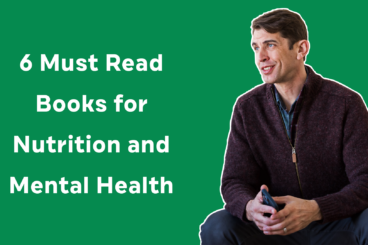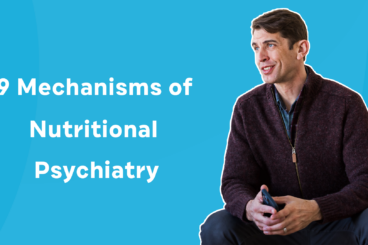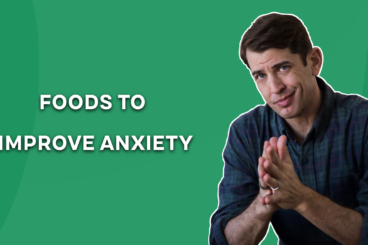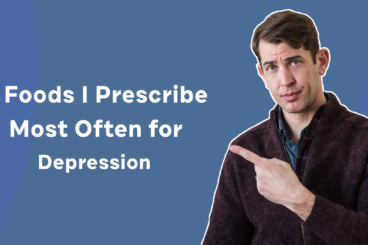Should everyone in mental health be talking about food? Yes.
Based on the evidence in 2021, if you are talking about mental health or thinking about mental health, you want to include food and nutrition in that conversation.
What is Nutritional Psychiatry? It’s the combination of mental health care, psychiatry and psychology and, and nutrition and food. If you’re not thinking about mental health, brain health and nutrition, you’re missing a huge opportunity. It doesn’t matter if you’re a patient, a clinician, or if you’re just kind of curious about how the brain works and how the mind works, nutrition definitely should be a part of that conversation.
Let’s Talk Evidence!
So let’s talk about the evidence first. Let’s start with the correlational studies. We all know correlation does not equal causation but when we look at the data of a population, for example, if people eat more seafood over their lifetime, does that matter to their risk of depression? Or if a new mom is eating lots of seafood, lots of leafy greens, and lots of plants does that matter in terms of her mental health?
These are the types of questions that Nutritional Psychiatry is asking and now has lots of answers to. So if, for example, you’re headed off to college, or are the parent of a college student, there’s a lot of data that you should be encouraging that student to eat the Mediterranean diet. That’s right, eating more olive oil, plants, and nuts, because there has been a significant amount of evidence saying that the quality of an individual’s diet in college directly correlates to the risk of depression and anxiety. And this is a time period, where there’s a lot of depression and anxiety, especially for young individuals, teens, college students and students. So that’s some of the correlational data. There’s a lot more, but if you line it all up, it looks like individuals who eat a diet with more plants, seafood, olive oil, nuts, more rainbows, have a 20 to 30% decreased risk of depression and anxiety.
Randomized Clinical Trials
So as I said, correlation, doesn’t equal causation. To really understand causation we need randomized clinical trials. And this is the real reason why everyone in mental health needs to start talking or thinking about nutrition in food. There’s so much interesting data when it comes to randomized trials. These are the gold standard in medicine, and there have been five randomized trials looking at food. That’s right, just using nutrition to treat clinical depression. These studies are usually added on to treatment. There’s an augmentation strategy. So individuals in the study were already taking an anti-depressant medication or some other medication and already in some type of psychotherapy. The first was the SMILES trial which looked at 67 individuals, most of them who were in treatment. They gave them Mediterranean style, nutrition counseling and found that 33% of those individuals went to full clinical remission. That’s astounding. If that was a medication that would be a blockbuster drug, but it’s just simple food.
Not only did they get better, individuals saved over a thousand dollars a year. That’s right, eating all this brain food is actually less expensive. So often we hear that is a barrier. What I love about the SMILES trial is it showed us individuals in mental health settings can really change how they eat and save money. Not to mention, it got their depression a lot better.
So after that, the second trial was the HELFIMED trial. This was one of my favorite trials because it used a group style, Mediterranean cooking class. This is a lot like the cooking class we’ve developed in our clinic, the Mental Fitness Kitchen. It’s an online cooking school. I hope you’ll check it out and join some of our classes with Chef Emilie Berner and our team. We do all kinds of wonderful things and make things like gazpacho, succulent shrimp salad and baked sardines.
So the HELFIMED trial did this intervention with individuals with really severe depression. It found that the majority of them dropped their depression and anxiety rating scales by about half. So it’s another remarkable trial.
After that there was a third trial. This trial was with depressed college students. They all watched a 13 minute video and then were given a little box that had olive oil, cinnamon, turmeric along with recipes, advice and encouragement. Then they called the students the next week for five minutes to ask how it’s all going with the new food and continued to follow up. They were just talking, no in-person contact time. When I hear this was with college students I though, this is definitely going to fail, right? Nope. Actually the results were amazing. At three months, the students had significantly decreased rating scales of depression, anxiety, and stress. And that lasted for six months.
Join Our Clinical Training Course
These are some of the studies that really support this idea that everyone in mental health needs to be thinking about nutrition. What are your patients eating? If you’re a patient, what are you eating? Are you supporting your mental health? Are you feeding your mental health with food for clinicians? That’s one of the reasons we developed our clinician training. It’s 10.25 hours of continued education credits. So it goes over all the basics of Nutritional Psychiatry and the evidence that we just talked about: the SMILES trial, SUN Navarra, HELFIMED. It talks about the clinical techniques that we use in the Brain Food Clinic, that we’ve developed with our clinicians to help best assess and then help people change how they eat to best feed their brain and feed their mental health.
I hope these reasons compel you to think about how you’re eating, and how your food relates to your mental health. And if you’re in a mental health treatment, if you’re a mental health clinician, I hope it encourages you and excites you about all of the new science and the new data coming out in this field.



